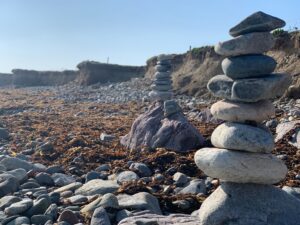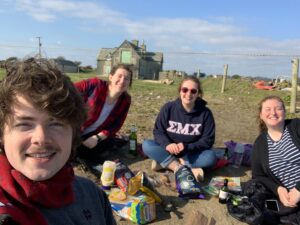Suddenly, it has been a year. This week marks the first anniversary of the changes instilled by the coronavirus pandemic, and I wanted to start my post by recognizing the significance of the moment and holding space for all the emotion that comes along with such a commemoration. No one is alone in this grief.
There is not much I can say on the state of the pandemic that hasn’t already been said, so instead I thought I would reflect a little on what the Wexford community has been up to recently, and where I’ve seen the Spirit moving in our lives.
Emma, Joseph, Anibee and I are spending the weekend with Fr. Denis at his Kilmore house; we are taking a short break from our virtual sacramental preparation lessons and music planning to enjoy the sunshine and breathe the salt sea air. I feel like I’m in heaven. As I write this post, I am sitting outside on the picnic table, relishing the sunshine and the gentle ache in my back from a thorough yoga stretch, marveling at the way the air in Wexford always smells so rich and earthy.
Yesterday, we went on a long hike along the seashore, picking our way along the rocky strand, doing some rock climbing when the sandy cliffs got too close to the water, stopping for a picnic of sandwiches and crisps perched on one of those cliffs. As Anibee and I balanced rocks into tall stacks and climbed through a seaweed-rich cave, I found myself reflecting on how relaxed I felt. The adventuring, the physical activity, and the connection to the natural world has been so restorative.
I’ve been thinking a lot about what I would be doing if there weren’t a pandemic, as many people must be, I’m sure. I’ve always been a very active person, and usually when I’m stressed or facing great changes, I join exercise classes or sign up for races. When I was first adjusting to college life, I started training for the Holy Half Marathon with my roommate Maddie. When I had a thesis to write and courses to focus on, I joined a cycling class that met at 7am on Mondays. When my mom passed away, I began training for another Holy Half and finished my college years the way they began: very sore and beaming, with Maddie by my side. When I was figuring out where I would be after graduation, I prioritized jogging to the gym on Saturday mornings for a 30-minute HIIT workout to help focus the rest of the weekend. I love being able to channel stress into physical activity with community, to chat with friends while jogging, to bond over yoga classes and spinning.

Since things are still very shut down in Ireland now, I’ve been doing a lot of hiking instead, and this weekend has reminded me how important it is to connect with my body and with nature while enjoying time with those around me. Since I’m not able to go to any exercise classes or start training for races, I’ve been having a difficult time focusing on anything other than pandemic fatigue and anxiety about the future. There are so many unknowns, and I have been struggling to find that radical trust that all will be well.
In a conversation with Sr. Anne recently, she offered a piece of wisdom that has changed the way I see the work of trusting. When I expressed how challenging it is to harness that trust out of thin air, she countered that trust is not passive, or simply an act of the will. It is a gift, a grace, part of a relationship with God, and requires the same kind of exercise one would designate to a muscle. “Pray for the gift of trust,” she told me.
The pandemic has done so much to test our capacity to trust that all will be well. A friend recently sent me an article about David Hume and Julian of Norwich that reiterated the importance of flexing the trusting muscle when approaching questions about where our good and just God can be found in a broken world. The author, Denys Turner, writes, “All we possess is but a narrative fragment, a torn-off corner of the manuscript of salvation history,” which tells Julian that she cannot provide a final justification of her theology beyond trust, since she had not yet experienced the beatific vision at the time of her writing. “Julian’s theology is truly spiral. It begins and ends where unending begins, as T. S. Eliot says. And maybe Eliot did get it right. At any rate, he got it from his reading of Julian” (Turner, “All Will Be Well,” Commonweal Magazine).
We haven’t seen the end of the pandemic yet, and we do not know what the telos of our short, rich, beautiful lives on this Earth will be, but we must trust, and ask God for trust, that all manner of things will be well.



